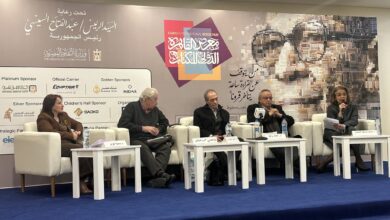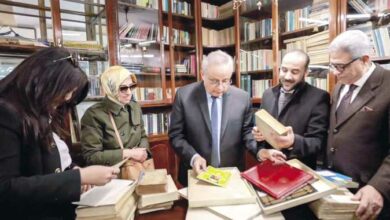Consummate writer, Dr. Alaa Al Aswany has been known to spend his early morning hours hammering out his challenging works with disciplined agility. Collected and self-assured, the acclaimed novelist met with Al-Masry Al-Youm in his unembellished dental clinic for the first in a two-part interview series to reflect on the ever-tumultuous and often unexpectedly rewarding process that is his primary occupation.
Al-Masry Al-Youm: Who were your literary influences as you were growing up, and as you worked to establish yourself as a writer?
Alaa Al Aswany: A lot. I learnt early on that you have to read a thousand times more than you write. I was fortunate to go to the French lycée, learning Arabic and French simultaneously. I also studied [dentistry at the University of Illinois] in the US and when I returned to Egypt I learnt Spanish. Being able to read in four languages has proven extremely valuable.
Classical Arabic literature was very important because that shapes your capacity to use the language. If your relationship with the Arabic language is weak, you’ll write difficult incomprehensible texts; you need to rely on strong linguistic resources to write lucidly and simply. And competence in the language doesn’t come from just learning proper grammar, it comes from studying the literary heritage. That’s the best teacher of the Arabic language, and I did it, following the advice of my father.
I consider Naguib Mahfouz one of the most important writers in the history of literature, and if he were European, or even Greek, would have been awarded the Nobel prize as soon as his trilogy was completed. Youssef Idris, of course, was an influence, as well as Tayeb Saleh, who’s a very important novelist.
French literature opened up a whole new world for me. It has its masters, of course, but [Jean de] La Bruyère, though not very well known, influenced me immensely. His “Caractères” was a lesson in how to draw a character with a pen instead of a paintbrush. I learnt a lot from him. I learnt Spanish in order to read a particular writer, Gabriel Garcia Marquez, who I consider the best living novelist.
In the English language, Ernest Hemmingway especially comes to mind as a writer I learnt a lot from. His writing has two special features: The first is his use of words with a precision that is practically scientific. He writes exactly what he wants to say, and nothing more. The second is what’s come to be known as his “false neutrality.” Writing has tones, just like speech, and I can communicate more than five different meanings saying something as basic as “good morning,” conveying anything from sarcasm to desire to disgust. Hemmingway writes prose that appears to be neutral, to the point that in the beginning you may suspect that it lacks character or color. But the drama’s in the undertones, and you eventually discover that he’s not neutral at all. He just keeps the dramatic and emotional energy of the text buried, and when it’s eventually transmitted to the reader it’s incredibly affecting. It’s this feature of his writing that earned him his place in world literature and influenced an entire generation of writers here in the 1960s. You’ll find it in the writings of Bahaa Taher, Alaa El Deib and Ibrahim Aslan. I picked this up as well, even though I don’t necessarily always apply it in my own writing. One of my favorite Hemmingway novels is “The Old Man and the Sea,” and you’ll certainly find it there.
Reading in all these languages no doubt shaped and benefited my abilities as a writer. You have to find your own style and voice, and that involves studying those of others. If you’re faithful to writing it reveals secrets to you; you learn how to convey the exact meaning you intend to express.
Al-Masry: Your critics often point to the simplicity of your prose as evidence of a lack of depth or the lyricism usually associated with classical Arabic texts. Some even go as far as to fear, given your popularity, an adverse influence it may have on the new generation of young writers. How do you respond to that?
Al Aswany: In every era that witnessed a degeneration of literature, or literary consciousness, you’ll find a common feature: associating the simple with the superficial and the complicated with the profound. It happened with Mamluk literature in Egypt. When, in fact, it’s the opposite that’s true. Most deep things in life, and in literature accordingly, are simple in appearance. And most frivolous things take on a complicated form to mask their frivolity. Thus, the idea that a great writer should be difficult to understand is false. Because most of those who write in a complicated fashion are in fact unable to write simply. The school of complexity and ambiguity most often masks a fragile and weak talent, and is originally an echo of a French school of writing, le nouveau roman (the new novel), that no longer exists – we have this problem here, where writers import literary schools of thought that don’t apply and copy them blindly. True talent is where you can express what you want to say clearly.
And there are plenty of examples. Marquez doesn’t have a single text that’s not comprehensible. And speaking of “The Old Man and the Sea,” this is a novel that I can give to my 12-year-old daughter and she’ll understand it, and she’ll enjoy it – it has action that involves a fish and a fisherman, and so on. I read the novel every five years and pick up things with every reading that I hadn’t understood before, that I was too young to understand. That’s literature. Anyone can write a complicated text that no one understands, but not everyone is Hemmingway. The idea is to write a text as fluid as water, as still on the surface, but one that exposes hidden depths.
Al-Masry: How did the extraordinary success of “The Yacoubian Building,” as well as the success of the film adaptation and subsequent television serial, affect your writing?
Al Aswany: We should discuss the term success because it can be misleading. The real reward of literature is not fame. For me it’s no big deal to be famous, especially when there are a lot of people who are famous when they haven’t really done anything creative. I see clearly that my job is to write novels. And for me success means being appreciated by both the readers and critics. And I’m proud to say that’s exactly what has happened to me.
I’m not against the adaptation of my novels into other artistic forms, and I’ve signed contracts for other adaptations of my works. But I still insist my real test is with the readers. And I must pass this test because the readers are who I write for, not a cinema audience. And accordingly I’m very proud of what I’ve accomplished. I’ve had great success not only in Egypt and the Arab world but all over the world; I’ve received numerous international awards as a novelist, and I can claim that my success was absolutely a literary one.
I believe you can’t think too much about success or the reaction to your work. You must be attentive to the feedback to uncover the shortcomings in your writing. But when you write you must write what you want to write, what you feel like writing, and not what you think will make you successful or feel that people expect of you. This is very important. You must not pretend; You must remain true and write from your heart.
After the success of “The Yacoubian Building” I quit writing for a year. Which is very exceptional for me, I usually write every day. But I quit for one year just to pull myself away because you can’t write under the pressure of success. Because two very dangerous possibilities arise: either you’re going to reproduce some formula to safeguard that success – and at that moment you’re no longer loyal to your work, no longer true, and I’ll never do that – or, you’ll get scared and paralyzed by some kind of phobia because you don’t want to lose that success. And in Arabic as well as world literature there have been some very good writers who’ve stopped writing because of this. They could not tolerate the idea of losing their success.
So I stopped writing for a year to get my internal peace back. And then I eventually said to myself, fine, now I have something to write so I’ll write, and I don’t care. I accept that I may never achieve this success again. And what happened, interestingly and thankfully, was that I maintained my success. I’ve always said that I write for an imaginary reader without any authority; I write for him, but I write what I want to write.
Al-Masry: Do you consider your novels separate experiences or parts of the same continuously-evolving work?
Al Aswany: There’s a beautiful quotation by Isabelle Allende, the great Chilean novelist, which I’ll paraphrase. She says, “The short story falls on my head like an apple, but for the novel, I must write everyday to see the novel, and keep writing to produce the novel.” I love this quote because within it there’s an assumption with which I absolutely agree. The assumption is that you do not invent novels, you discover novels. The novels already exist in your heart and mind as a novelist. And your job is to concentrate to bring this novel out. And this is the same idea expressed by Michelangelo, who said he doesn’t sculpt but instead removes the excessive, irksome marble concealing his statues, which I feel is a very profound vision of art. He already sees the statue, he just frees it. That exactly is what art is for me.
Al-Masry: Is one of the novels your personal favorite?
Al Aswany: I can’t say favorite exactly, but I’m probably more emotionally attached to “The Yacoubian Building” because, first, it was a turning point in my career, and, second, it was my first real meeting with my readers. I had produced 3 books before it but they were not published in the real sense of the word. There were small printings of about 500 to 1,000 copies. Last year we celebrated 1 million copies of “The Yacoubian Building” in 23 languages other than Arabic. And the critics and publishers are expecting my upcoming books to sell even more. I think this is the real reward of writing.
Al-Masry: Are you working on a novel now?
Al Aswany: I’m always working, but I can’t talk about it. I’m protective of my works in progress and I’ll tell you why. Part of your enthusiasm comes from believing that your idea is powerful. But if you announce it before it’s complete, you could get a reaction where the person you’re talking to feels it’s no big deal. This could put me off to the point where I stop writing. So I don’t talk about it, but it should be done by next year.
Tune in next week for the second part of this interview series, in which Al Aswany discusses presiding over literary competitions, his latest newspapers columns – including those covering the Egypt-Algeria football debacle – and the broader implications of the backlash against his last novel “Chicago.”




